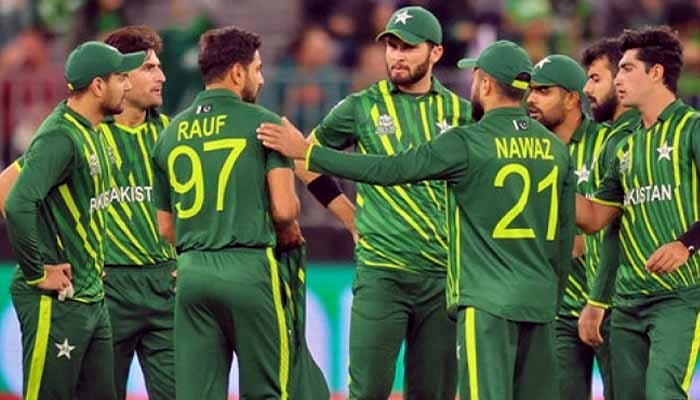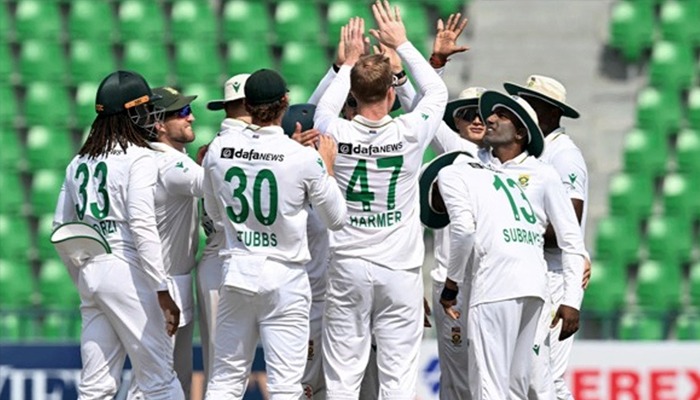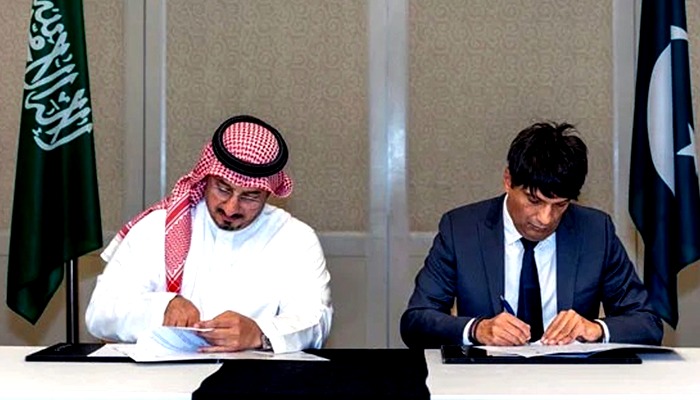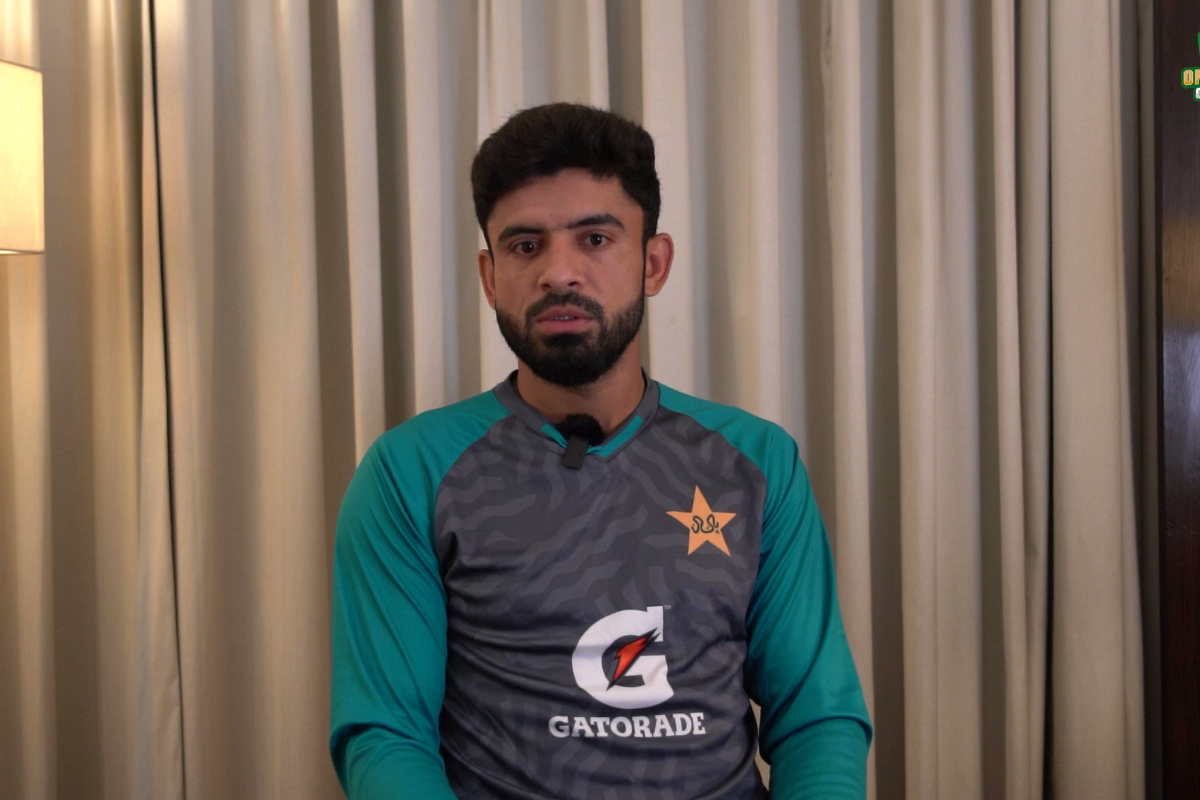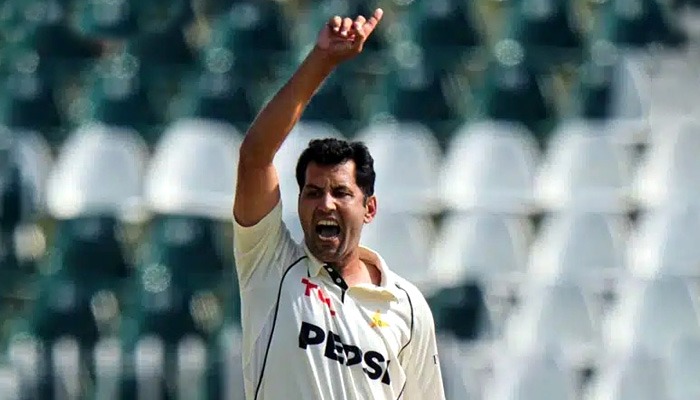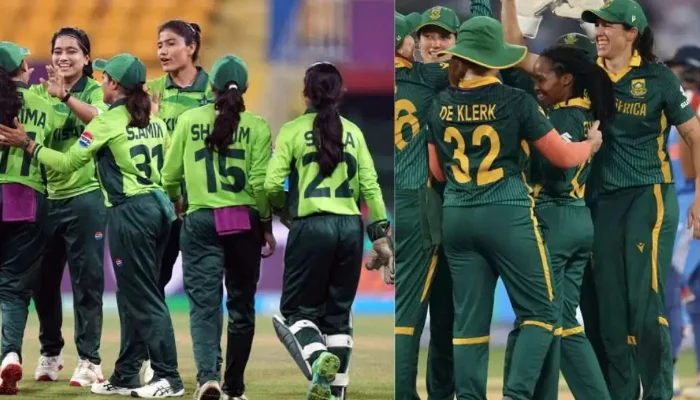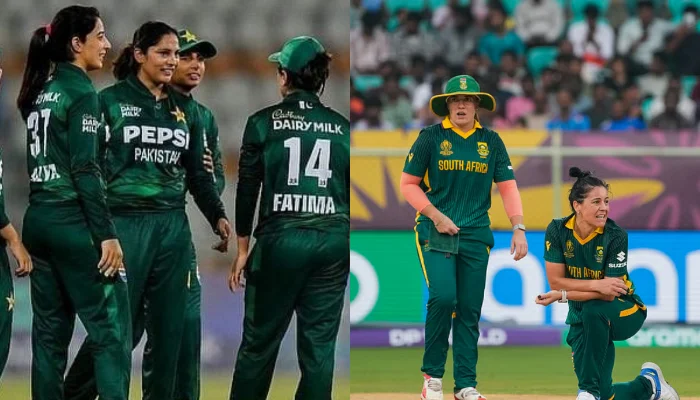The irony was not lost as Ramiz Raja sat alone on a wide, specially made stage in the indoor net practice hall of the High-Performance Center, clad in the traditional Pakistani dress as he pulled no punches in conveying that he has come in to clean up the “mess’” prevailing in Pakistan cricket.
The scene hours after he took over as the Pakistan Cricket Board (PCB) chairman, at once signified how the cricket in Pakistan was going to be run from that afternoon on – with a singular vision, imperiously, disruptively and with an overt nationalism with ‘Cricketers First’ as the mantra.
Ramiz also sent a clear signal in the public domain to the then CEO Wasim Khan sitting far away on his left alongside other board members and senior management: I’m here to run your job. Period.
Hearing the intimidating words of Ramiz and watching the uneasy body language of Wasim, I tweeted at the time:
Expect resignation of #WasimKhan from now to end of #t20worldcup2021. I doubt if a CEO's been so clearly hinted at by an incoming Chairman of being responsible for "mess" — no #DRS/other issues like fc cricket, coaching, etc. Plus #ramizRaja's clearly assumed all CEO functions.
— Sohaib Alvi (@SohaibAlvi) September 13, 2021
Yet I take no pleasure in being correct or prophetic as Wasim handed in his resignation in the following weeks. It disappointed me then and it saddens me now, at how he has been implicitly profiled as inept, visionless and having harmed Pakistan cricket.
If that was at all the conclusion, justified or not, it would have been decent to have limited the directed criticism to behind closed doors.
A two-line courteous farewell in a press release cannot disguise what was conveyed superciliously in front of media and for posterity a couple of weeks back. The fact that his resignation was unanimously accepted within hours and with immediate effect is a further affront to his reputation. A society is judged by how they bury their dead. Leadership is judged by how it treats the vulnerable.
Let me add that I was not much excited at the time by his appointment just under three years ago, wondering how it’s possible that the PCB Board HR committee and a top headhunter couldn’t find a competent C-Suite career professional from within Pakistan at less than half the remuneration. And to not foresee how challenging it would be in a working environment and corporate culture that remains at complete odds to what he had risen through in England.
The PCB is once again expected to be populated by the usual suspects. Self-respecting and highly competent executives, both at home and abroad, who can bring in the change long-term and question the chairman or the board, will henceforth be vary of offering their talent to Pakistan cricket in future.
Take Faisal Hasnain who has now been brought in his place. Admittedly, he too has worked abroad all his life like Wasim Khan. But born and schooled in Pakistan plus his professional experience in the Gulf, having worked with expatriates from South Asia, will have exposed him to a fair understanding of the crude shenanigans that go on in government-influenced environments here.
Straightaway, he has been his master’s voice. His comments in the joint press conference with Ramiz on Pakistani pitches as being one of the main reasons for international teams not wanting to tour the country indicates he is here to agree on issues he has no first-hand knowledge of.
Yes, he has been exposed to the chiefs of all cricket boards while at the ICC, where pitches are discussed and complained about. But to be so naïve as to overlook that all international teams still tour India and Bangladesh despite their apprehensions about pitches there and that the only reason ever cited since 2009 for not touring Pakistan has been player safety in the country indicates that a strong CV does not necessarily make for a strong-minded C-Suite executive who can question or deny or at least ignore a senseless contention, just for the sake of running down the previous administration.
One can expect some disagreements on minor issues to show the CEO’s independence for the public eye. But the proclamations of Ramiz ever since assuming the chairman’s office has left no doubt the CEO is there for the formality and to toe his line despite the revised PCB constitution giving him more power and independence than the chairman.
But then one can’t expect an independent-minded senior executive to now come in when the atmosphere at Gaddafi Stadium is akin to the George Bush dictum post 9-11 “Either you are with us or……”. Add to that the fear of public castigation of one’s professional competence whenever there will be a new, agenda-driven boss who has to justify the change will keep self-respecting, legacy driven change-makers away.
Not that this is in defense of the departed Wasim Khan. The current appointment with doubts on its efficacy does not make a previously flawed appointment right. Wasim wasn’t any outstanding success in those three years that could justify his selection from among hundreds, and at that expense.
Yes, he worked with due diligence in improving compliance and governance, reorganizing all departments in PCB. He also impressively upgraded the package and facilities for domestic cricketers and added more tiers to domestic teams’ management, coaching and fitness. All matches of domestic cricket were telecast through a professional production with most of the international commentators commenting on the matches.

Wasim made the Academy more purposeful and pragmatic by hiring the legends of Pakistan cricket to help cricketers at all levels to benefit from their knowledge and experience. He built partnerships in various fields and also established the basic structure of provincial boards, now in place; and set rolling the revival of club cricket.
Despite all that the fact that he bowed to Prime Minister Imran Khan’s wishes to adopt the Australian system of six teams when Pakistan’s population is 10 times that of Australia showed that he undervalued his self-respect and all the values he had been brought up to stand for. In that way, he was no different than a government servant who would receive a 10th of the salary and perks he had been given.
I mean, it has to be asked whether, if he’d been the CEO of ECB and if PM Johnson would have ordered him to reduce first-class county teams from 18 to 6 with no questions asked, would he have agreed to continue in the job? Yet he was not principled enough to take a stand when his approved structure for Pakistan’s domestic cricket was ridiculed and dismissed by Imran Khan in front of his subordinates. If he is as good as he is touted to be, he could have walked away with a good offer within six months.
Then, one of his first decisions was to fire his COO saying that now that PCB had a separate Chairman and CEO, this position no longer existed as the constitution had been amended. Yet within weeks, he filled up that position with extremely expensive hiring.
His incredulous appointment of Misbah as national team coach within two years of his retirement and despite him having never coached even a club side, stunned even the most radical thinkers.
Especially after PCB had taken out an ad asking for a minimum of two years experience as a coach of an international team. The very fact that his application was entertained went against all rules of conflict of interest, Misbah having been chosen as one of three committee members to decide on the extension of Mickey Arthur’s contract as Pakistan coach.
To top it all, he simultaneously made him the Chief Selector, an experiment done once by New Zealand several years back and rescinded as unworkable.
He then asked Pakistan’s captain, Sarfaraz Ahmed, to resign and when he refused, sacked him. It caused a stir as Sarfaraz had lifted Pakistan to No.1 standing in the T20I format and had won 11 T20 series in a row, winning 29 of 37 matches. Only two years earlier, Sarfaraz had been named as captain and wicketkeeper of the ‘Team of the Tournament’ at the 2017 Champions Trophy by the ICC. A few weeks earlier, he had led Pakistan to wins in 5 out of 9 games in the 2019 World Cup, winning the last 4 and failing to qualify for the semis due to a decimal point and a washout against Sri Lanka.
A more mature and sensible way would have been to take away one format like Tests where he didn’t have a good record. By doing that he completely changed the direction of Pakistan cricket from a positive mindset to a defensive one.
The only solace for Wasim was that Mohammad Rizwan proved a revelation. But that was not why Sarfaraz had been removed. Nor had Rizwan, at that time, ranked somewhere beyond 150 as a T20I batter and not even played by his own franchise, expected to achieve what he has done today. Sarfaraz’s ODI ranking at that time remains more than double the ranking of Rizwan in ODIs today, where Sarfaraz still leads by 35 places.
Wasim quickly avoided giving interviews to those in the media who could ask him tough (though admittedly rude) questions and in fact, even lashed out at the media’s character a few months back, though he did apologize a couple of days later. His inflexible attitude toward accommodating the franchise owners on some crucial issues was also seen as harming the relationship with the key stakeholders of the PSL.
The numbers crunched in the much-touted tripartite marketing and broadcast arrangement for domestic and international cricket — with a forecast of $200 million revenue over 3 years by airing the games on PTV Sports — seemed based on complete fantasy. Not surprisingly only 10% of the target revenue was reported to have been earned after the first season.
The curtailment of the tour by NZ and subsequent cancellation by ECB was admittedly out of his control. However, the fact that ECB CEO left it to his COO to call up Wasim to convey their decision, did not do much for his standing within PCB.
It must be said, however, that the responsibility for his appointment and for the repercussions of what could have been a wrong fit, lies with the former PCB Chairman and the Board of Governors (BoG), whether it was an independent decision by them on merit or under influence from powerful lobbies in the government, which the PCB is completely subservient to for all practical purposes.
It was Wasim however who suffered most, trying to implement policies and a system that possibly impinged on political agendas and self-serving objectives of some of those under him.
Even Prime Minister Imran Khan, a globally respected and admired icon for over 40 years, wielding supreme powers as the country’s leader, has openly expressed his frustration and inability to even partly implement national reforms against powerful mafias in industry and bureaucracy, at times due to one or more of his own advisors’ culpability.
Yet the members of the BoG expected that a near anonymous man with a career in management of a small county team, brought in from the west, with zero experience of working in the east, could lead and transform an organization that is and has been for several decades, rife with nepotism, destructive politics, alleged corruption, political influence and personal fiefdoms that have eaten for breakfast the most powerful men in the country sent to reform them.
So yes, Wasim Khan was in my opinion far from being the best match for the job of PCB CEO before or at any stage across his three years tenure. But how he was publicly shamed for his failures — some real, some perceived — with no mention of any specific good he may have done, is likely to have done more harm to Pakistan cricket than any good.
Independent decision making at all levels on potentially accountable issues will now stop. Already we have seen that some senior executives hired by Wasim Khan have either been fired or left within these past 4 months. Were they the best people for the job and most competent? Not necessarily. Did they deserve to be publicly questioned, even indirectly, just to portray that everything in the previous management was a “mess”? Not done.

For Pakistan cricket, it is crucial that Ramiz succeeds and implants the right vision and structure. He is an honest man who believes in himself and has seen the heights of Pakistan cricket. However, he must realize and accept publicly whatever good that has been done by past management. Otherwise, the day any of his initiatives backfire or do not deliver, he will end up seated alone on that stage again, with ‘alone’ having an entirely different connotation.
END
Sohaib Alvi has been covering cricket at home and abroad for over 40 years as columnist, editor, analyst, TV expert/host. An MBA from IBA he has simultaneously had a 35-year career in the corporate sector, having worked in C-Suite positions. He now advises clients on leadership, business strategy, marketing and organizational planning.
[embedpost slug= “/ben-cutting-hopes-australia-are-cleared-to-tour-pakistan-next-year/”]













